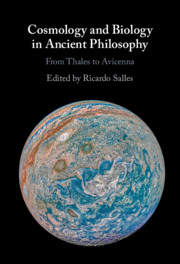Book contents
- Cosmology and Biology in Ancient Philosophy
- Cosmology and Biology in Ancient Philosophy
- Copyright page
- Contents
- Contributors
- Acknowledgements
- Introduction The Intersection of Biology and Cosmology in Ancient Philosophy
- Chapter 1 Souls and Cosmos before Plato
- Chapter 2 The Ensouled Cosmos in Plato’s Timaeus
- Chapter 3 Platonic ‘Desmology’ and the Body of the World Animal (Tim. 30c–34a)
- Chapter 4 The World Soul Takes Command
- Chapter 5 Begotten and Made
- Chapter 6 The De Motu Animalium on the Movement of the Heavens
- Chapter 7 Biology and Cosmology in Aristotle
- Chapter 8 Recapitulation Theory and Transcendental Morphology in Antiquity
- Chapter 9 The Stoics’ Empiricist Model of Divine Thought
- Chapter 10 Why Is the Cosmos Intelligent?
- Chapter 11 Cardiology and Cosmology in Post-Chrysippean Stoicism
- Chapter 12 The Agency of the World
- Chapter 13 God and the Material World
- Chapter 14 At the Intersection of Cosmology and Biology
- Chapter 15 Is the Heaven an Animal?
- References
- Index
- Index Locorum
Chapter 6 - The De Motu Animalium on the Movement of the Heavens
Published online by Cambridge University Press: 21 May 2021
- Cosmology and Biology in Ancient Philosophy
- Cosmology and Biology in Ancient Philosophy
- Copyright page
- Contents
- Contributors
- Acknowledgements
- Introduction The Intersection of Biology and Cosmology in Ancient Philosophy
- Chapter 1 Souls and Cosmos before Plato
- Chapter 2 The Ensouled Cosmos in Plato’s Timaeus
- Chapter 3 Platonic ‘Desmology’ and the Body of the World Animal (Tim. 30c–34a)
- Chapter 4 The World Soul Takes Command
- Chapter 5 Begotten and Made
- Chapter 6 The De Motu Animalium on the Movement of the Heavens
- Chapter 7 Biology and Cosmology in Aristotle
- Chapter 8 Recapitulation Theory and Transcendental Morphology in Antiquity
- Chapter 9 The Stoics’ Empiricist Model of Divine Thought
- Chapter 10 Why Is the Cosmos Intelligent?
- Chapter 11 Cardiology and Cosmology in Post-Chrysippean Stoicism
- Chapter 12 The Agency of the World
- Chapter 13 God and the Material World
- Chapter 14 At the Intersection of Cosmology and Biology
- Chapter 15 Is the Heaven an Animal?
- References
- Index
- Index Locorum
Summary
This chapter explores Aristotle’s criticism of the Platonic idea of a cosmic soul as a first principle of motion, in the theory of animal voluntary motion that heoffers in theDe Motu Animalium. According to Aristotle, animal self-motion and the movement of the heavens are alike in that they both depend on an unmoved mover. But it is not immediately clear how this comparison works in detail, since for Aristotle the unmoved mover in animal motion is not directly an external object of desire but the animal’s thinking about an object of desire. Hence, there must, for Aristotle, be some parallel thinking involved in the movement of celestial bodies. Such an account, however, is missing from the De Motu Animalium. To find one, we need to consider the metaphysical cosmology set forth in Lambda, chapters 6–10 of Metaphysics, which posits a soul for each of the moved heavenly bodies, a soul which thinks of the sole absolutely unmoved mover of the universe, indesiring it through a form of rational desire. Thus Aristotle departs sharply from both Plato in the Timaeus and the subsequent Platonic, Stoic and Neoplatonic traditions, according to which celestial motion is not be explained by individual souls in each of the moved celestial bodies but by a single soul of the cosmos as a whole , located at the outermost sphere of the cosmos.
- Type
- Chapter
- Information
- Cosmology and Biology in Ancient PhilosophyFrom Thales to Avicenna, pp. 101 - 108Publisher: Cambridge University PressPrint publication year: 2021

